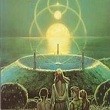
inspiration from a Si-Fi novel by Arthur C. Clarke, whales recorded by Kent Noonan, Whalesong Project, www.whalesong.net
Story behind the song
Whale recording by Kent Noonan, Whalesong Project
The Songs of Distant Earth
A novel by Arthur C. Clarke
published May 1986
"The Songs of Distant Earth" is an engaging story centered around one of Arthur C. Clarke's deceptively simple plot hooks:
Prior to the destruction of the Earth in a nova 1,500 years from now, "seedships" were sent to the stars so humanity could live on.
An early seedship birthed a small, Eden-like civilization on the scattered islands of a planet dominated by oceans, called Thalassa.
Now, hundreds of years after this society achieved near perfection, another much faster seedship has arrived.
This new ship is carrying the last, traumatized people who have come directly from the now destroyed Earth.
Like most of Clarke's work, "The Songs of Distant Earth" is a story driven by ideas.
Ideas about how the future of humanity will turn out.
Ideas about how we will eventually solve the problems of today.
Ideas about how we will finally reach the stars, and what we'll do when we get there...
The first third of the book, maybe even the first half, is a never-ending stream of theories and predictions and discoveries.
One of the author's great strengths is his ability to easily yet convincingly paint a picture of mankind's future.
What takes other authors chapter after chapter to flesh out, Clarke manages in small and succinct bites.
Clarke lures the reader along with hints of discovery at every turn, and discovery, not preaching, drives the story.
This is best reflected in the discovery of a deep sea intelligence indigenous to Thalassa.
Clarke's revelations about them are spaced evenly throughout the novel, all the better to lure you along, and walk that fine balance between telling you enough to keep you interested, but not so much that your imagination is spoiled.
Because Clarke's stories generally don't hitch on some raging conflict or objective-based scenario, this one included, the ending may seem anti-climatic..
Plot threads introduced midway through the book that look as if they will heat up are resolved well before the end.
But that is Clarke.
He presents an idea, a snapshot of the future, serves up a slice and gets out before the idea wears itself thin.
That is a great strength of his work.